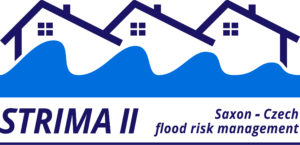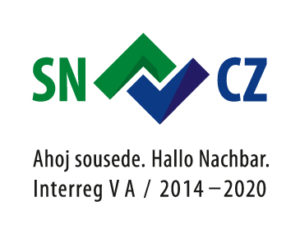
STRIMAII: Saxon-Czech Flood Risk Management II
 |
 |
 |
Analysis of tools and measures for the flood damage mitigation on buildings, infrastructure and in the countryside.
Cross-border cooperation in flood risk management is important not only because the emergency information sharing is needed to improve preparedness. Other reasons are the need for the flood management experience exchange and the coordination of damage mitigation strategies. Crucial actors in this process are Mayors of (potentially) affected villages, citizens and entrepreneurs influencing run-off conditions in the river basin scale. The project builds on the first steps undertaken within STRIMA and aims to further deepen the cross-border flood risk management, including the prevention of damages on buildings and infrastructure. It also supports the continuity of cross-border flood risk management forums. Important part of the project is the economic and institutional analysis of natural flood retention measures.
| Funding agency: | Cooperation Programme Free State of Saxony – Czech Republic 2014-2020 |
| Duration: | 7/2017 – 12/2020 |
| Contact person: | Jan Macháč, e-mail: machac@ieep.cz |
| Researchers: | Jan Macháč, Lenka Slavíková, Monika Krpešová (Stehlíková), Pavel Raška, Marek Hekrle, Alena Vacková |
| In cooperation with: | Sächsisches Landesamt für Umwelt, Landwirtschaft und Geologie (LfULG), Leibniz-Institut für ökologische Raumentwicklung (IOER), ČVUT v Praze, Agentura regionálního rozvoje v Liberci |
| Project web pages: | https://www.strima.sachsen.de/ |
DeMaRisk: Individual and Organizational Decision-making in Environmental Risk Reduction: Determinants, Motivations and Efficiency
What factors influence the preparedness of individuals and organizations to effectively cope with natural disasters?
The environmental hazards have struck societies with considerable intensity and recurrence and their impacts are relative to the resilience of the society concerned. The effective ways to reduce environmental risk are related to social action and learning at different institutional levels and efficient risk reduction must be based on balance between individual and institutional approaches through participation and governance. Nevertheless, current writing frequently reduces the two-way nature of the participation process and it only partly analyses individual action as a formative component of institutional frameworks, which is even more distinct in Central-Eastern European context. In this project, we use the multilevel approach to analyse the determinants and mechanisms of how do individuals and institutions learn to reduce risks. We particularly address questions: What are the factors that determine the individual and organizational decision-making in risk reduction? How does the individual learning co-form the institutional frameworks of risk reduction? How are these mechanisms influenced by political-societal context of Central-Eastern Europe?
| Funding Agency: | Czech Grant Agency (project is coordinated by the Faculty of Science of Jan Evangelista Purkyně University) |
| Duration: | 1/2016–12/2018 |
| Contact Person: | Lenka Slavíková, e-mail: slavikova@ieep.cz, lenka.slavikova@ujep.cz |
| Researchers: | Pavel Raška, Lenka Slavíková, Jan D. Bláha |
| In Cooperation with: | Charles University Prague, University of Ostrava |
| Downloads: | Slavikova, L., Raska, P., & Kopacek, M. (2019). Mayors and “their” land: Revealing approaches to flood risk management in small municipalities. JOURNAL OF FLOOD RISK MANAGEMENT, 12(3), e12474. https://doi.org/10.1111/jfr3.12474
Slavikova, L. (2018). Effects of government flood expenditures: the problem of crowding-out. Journal of Flood Risk Management, 11(1), 95–104. https://doi.org/https://onlinelibrary.wiley.com/journal/1753318x |
Evaluation of the Cost Proportionality of Reaching the Good Water Status
The proposal of the process of the justification of the cost disproportionality exemption for the purpose of Water Framework Directive goals fulfillment.
The implementation of the Water Framework Directive (No. 2000/60/EC) brought the commitment to reach “good status” of all water bodies until 2027. In reality, this means the adoption of numerous investment measures in order to decrease the pollution inflow and to improve the morphology of water bodies. However, achieving “good status” is associated with large investments, often beyond the capabilities of polluters. In justified cases, member states may request an extension of the deadline based on disproportionality of the costs of meeting the WFD requirements (Article 4). The Directive doesn’t provide a clear explanation how the cost proportionality should be assessed. Within the project, the Czech methodology certified by the Czech Ministry of Agriculture was developed. Our approach is grounded in cost-benefit analysis and compared with alternative approaches, such as “new Leipzig approach” (see the enclosed case study).
| Funding Agency: | Technology Agency of the Czech Republic |
| Duration: | 1/2014–12/2015 |
| Contact Person: | Lenka Slavíková, e-mail: slavikova@ieep.cz, lenka.slavikova@ujep.cz |
| Funding Agency: | Jan Macháč, Lenka Slavíková, Ondřej Vojáček, Jan Brabec |
| In Cooperation with: | Water Research Institute of T. M. Masaryk |
| Outputs: | Macháč J., Brabec J., Slavíková L. (2016): Pilot study of cost proportionality analysis according to the “new Leipzig approach” in the Czech Republic. Ústí nad Labem: IEEP, Institut pro ekonomickou a ekologickou politiku, Univerzita J. E. Purkyně (v anglickém jazyce). |
| Downloads: | Pilot study of cost proportionality analysis according to the new Leipzig approach in the Czech Republic (pdf) |
| Use of Results: | The methodology certified by the Czech Ministry of Agriculture |
Economic Analysis of the Euthrophication Problem at Orlik Reservoir
Evaluation of the cost-effectiveness combination of measures in the river basin scale for the euthrophication reduction in the large dam Orlik.
Within large European project REFRESH, the IEEP and IREAS, Institute for Structural Policy teams were responsible for the economic analysis of the euthrophication problem at Orlik water reservoir situated at Southern Bohemia. The analysis contains the cost-effectiveness evaluation of proposed measures for the phosphorus inflow reduction. Further, benefits derived from the water improvement were assessed based on the benefit transfer method. Proposed measures and results of the evaluation were consulted with key local stakeholders and distributional impacts on different economic sectors (main cost bearers and benefit receivers) were described as well.
| Funding Agency: | Biology Centre of the Czech Academy of Science |
| Duration: | 10/2012–12/2013 |
| Contact Person: | Lenka Slavíková, e-mail: slavikova@ieep.cz, lenka.slavikova@ujep.cz |
| Researchers: | Lenka Slavíková, Ondřej Vojáček, Jan Macháč, Tomáš Smejlal, Josef Hejzar, Eva Cudlínová |
| Outputs: | VOJÁČEK, Ondřej; HEJZLAR, Josef; SLAVÍKOVÁ, Lenka; MACHÁČ, Jan; SMEJKAL, Tomáš; CUDLÍNOVÁ, Eva. Cost-effectiveness analysis report for the Vltava catchment, Czech Republic, including analysis of disproportionality. |
| Downloads: | Cost-effectiveness analysis report for the Vltava catchment, Czech Republic, including analysis of disproportionality (pdf) |
SE CLIMATE: A Socio-economic Analysis of ClimateChange Impact within the Context of Water Management in the Czech Republic
Design and evaluation of the economic instruments for the effective water allocation in the Czech Republic (under the condition of inreasing scarcity of water)
“Hydrological research (monitoring water quality and quantity, extreme phenomena – floods and drought) constitutes the basis for climate change impact research. However, it is not able to provide specific answers regarding future water scarcity. The existing water management needs to reflect this uncertainty and adjust administrative and market-based instruments in order to better address actual water scarcity. Therefore, the project aims at:
1. Evaluating the available information resources on links between climate change and water in a European (Czech) context and methods of processing them.
2. An analysis of water resources accessibility and its impact on market segments, a model of climate change influence on the effectiveness of direct and indirect instruments in water management.
| Funding Agency: | Czech Ministry of Agriculture |
| Duration: | 1/2009 – 12/2011 |
| Contact Person: | Lenka Slavíková, e-mail: slavikova@ieep.cz, lenka.slavikova@ujep.cz |
| Researchers: | Jiřina Jílková, Lenka Slavíková, Adéla Romášková, Vítězslav Malý, Ondřej Vojáček, Jan Kavan |
| In Cooperation with: | Water Research Institute of T. M. Masaryk |
Socio-economic Analysis of the Territories Chosen for the Future Accumulation of Surface Water
How could socioeconomic indicators influence the decision-making about the appropriateness of the regulation limiting the development of municipalities because of possible future dam construction?
The regulation limiting the development of municipalities is applied at places that are about to be flooded in future because of possible dam construction. The question is how many of such places should be regulated and how to communicate the regulation with affected inhabitants in (usually small) municipalities.
The goal of the study developed for the Czech Ministry of Agriculture was to create the comprehensive database of socioeconomic indicators for affected municipalities, to verify into what extent the existing regulation truly affects the municipal development and to propose the methodology how to proceed with the evaluation of particular places (in order to reduce their list in future).
| Funding Agency: | Czech Ministry of Agriculture |
| Duration: | 2007 |
| Contact Person: | Lenka Slavíková, e-mail: slavikova@ieep.cz, lenka.slavikova@ujep.cz |
| Researchers: | Jiřina Jílková, Viktor Květoň, Lenka Slavíková |
EcoEval: Economic Development Based on the Environmental Evaluation in the German–Czech Border Region
Into what extent the ecological quality and aesthetical beauty of rivers affects the tourism potential?
High quality of natural resources (together with their aesthetical beauty) affects the potential of the nature-based tourism in the region. This linkage, however, is difficult to capture by numbers. The goal of the Czech-German cross border project is to evaluate the aesthetical beauty of rivers (with the use of the case study of a lido development in Pirna and Decin) and to support the development effort of municipalities.
| Funding Agency: | INTERREG IIIA |
| Duration: | 2/2007–7/2008 |
| Contact Person: | Lenka Slavíková, e-mail: slavikova@ieep.cz, lenka.slavikova@ujep.cz |
| Researchers: | Robert Holländer, Zuzana Khendriche Trhlínová, Hana Švejdarová, Andreas Bohne, Linda Kochmann, Jan Slavík, Lenka Slavíková |
| In Cooperation with: | University of Leipzig |
| Downloads: | Presentation: Holländer, Robert: Economic Evaluation in EU Water Framework Directive (pdf) Khendriche Trhlínová, Zuzana: Economics of tourism (pdf) Švejdarová, Hana: The Economic Value of the Cultural Landscape: How to Evaluate the Non-production Services of a Territory (pdf) |
| Use of Results: | Development of databases, case studies and bilateral teaching courses. |
Municipal Consensus Building in Flash Flood Mangement
Research on initiatives, measures and problems faced by Mayors of small municipalities being regularly affected by flash floods.
In the Czech Republic numerous projects have been dealing with disastrous flooding occurred in 1997, 2002 or 2006. The problem of flash floods that annually hits more than 60 places is under investigated. The goal of the research project is to investigate and compare strategies of small Czech villages to cope with flash floods and to promote the information sharing in this matter.
| Funding Agency: | Czech Grant Agency |
| Duration: | 1/2005–12/2006 |
| Contact Person: | Lenka Slavíková, e-mail: slavikova@ieep.cz, lenka.slavikova@ujep.cz |
| Researchers: | Lenka Slavíková, Jiřina Jílková, Pavel Hromádka |
Damages Caused by Natural Disasters
Economic analysis of flood damages and public flood expenditures on disastrous floods in 1997 and 2002.
Research project focused on the development of the economic classification of flood damages and the detailed analysis of public expenditures on two disastrous floods. For the analysis, the data from the national accounting was used.
| Funding Agency: | Czech Ministry of the Environment |
| Duration: | 9/2004 – 12/2005 |
| Contact Person: | Lenka Slavíková, e-mail: slavikova@ieep.cz, lenka.slavikova@ujep.cz |
| Researchers: | Lenka Čamrová, Jiřina Jílková |
The IEEP published the new report on the economic evaluation of urban adaptation measures
Within the project UrbanAdapt, the IEEP published the economic evaluation of selected climate change adaptation measures in Prague, Pilsen and Brno (study available only in Czech). Summary of outputs in Englich is available here.

